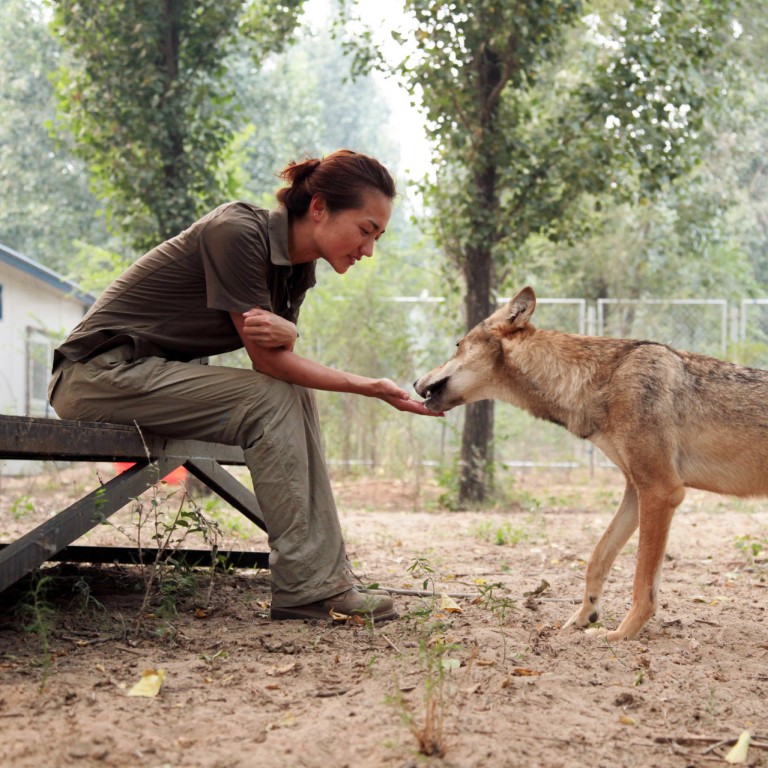
Call of the wild proves too strong for Chinese animal lover Rain Wu
Rain Wu's passion led to a career change that saw her caring for wolves on a Chinese film. Now her dream is to set up an animal rescue centre
Rain Wu, 36, a veterinarian educated in New Zealand, feels lucky she had the chance to live with, and win the trust of, a group of wolves when French director Jean-Jacques Annaud shot his Chinese-language film in Inner Mongolia . While working at an animal hospital in Beijing, Wu carried out a successful operation on a young wolf called Cloudy, which was seriously ill with an intestinal obstruction. She was later invited to help the film's production team care for 16 wolves on the grasslands of northern China. Wu runs the Cuddles International Pets Resort on the outskirts of Beijing, caring for pets while the owners are away. Her dream is to set up an animal rescue centre.
My parents sent me to study finance in New Zealand where I also earned a master's degree in applied statistics. After graduation, I took a marketing job at a yacht sales company, then worked in a big shopping mall. But I was tired of repeating that kind of work everyday. Had the Australian embassy not turned down my visa request, I would have gone to Macquarie University to prepare to become a chartered accountant. But everything changed when I took a few veterinary science courses at Massey University while waiting for the visa. Born to love animals, I turned a new page in my life. "I'm not going to Australia," I told my parents. They were very disappointed, but couldn't change my mind. I love animals more than human beings.
The five-year study was intense and the tests were hard, but the work is full of fun. I never found the same joy when dealing with business or finance. Signing a big sales contract might make people feel good, but to me nothing makes you happier than saving an animal's life, seeing it wag its tail back home.
Sadly, what I remember most deeply are often the times when I failed to cure patients. I tried my best, but still felt bad for not being successful. Sometimes it was due to the limits of medical science, imperfect medical conditions, or economic considerations that stopped animal owners paying for costly operations. But there have been lots of happy moments, too. I did an operation on an old stray dog, called Twister, two years ago in Thailand. He was very weak and thin, with a pale face and broken legs. This year I returned and he's much stronger, his fur's shining. He recognised me immediately. He came up to me, happily wagging his tail. Even better was the news he had been adopted by a family in the US. I felt so happy for him.
After I saved Cloudy, I was invited to take care of the wolves, the stars of the film. I fed them, played with them and trained them to cooperate with the filmmakers. They were willing to show up and cooperate with others only when the people they trusted were on site. It's a quite high level of trust, isn't it? Unlike pets such as cats and dogs, wolves tend to hide their feelings. That's because wild animals can easily be preyed upon if their weakness is exposed to predators. Therefore, I had to observe them carefully to check if there was anything wrong with them. The males also fought with each other everyday to decide on the new "king". We also had to be very cautious not to appear vulnerable. Otherwise they might attack us just to show their power. They are more interesting than dogs, smarter and to some extent more loyal.
A dog can obey instructions from any human boss, but it's hard to please a wolf if he or she dislikes you at first glance, regardless of how hard you try later. But if they like you from the start, they will retain the same feeling to the end. They may not miss you so much when you are apart, but they will never forget you.
It varies. Sometimes it takes two or three days, sometimes it's much longer. But animals are simple. As long as you are patient enough, they will definitely reward you with trust.
Yes. We are taking care of a macaw, a ferocious bird. His mouth can easily crack a hard walnut. He suffered a lot of anxiety after feeling ignored by his owner and was obsessed about picking his feathers. He's a very, very smart bird who needs lots of attention. But it remains a challenge for me to build closer contact with him, even though his beautiful feathers are fully grown now and he likes to play at our place.
I may pursue doctorate studies in wildlife protection or ecosystems one day. In the near term, I plan to establish a self-sustained animal welfare centre. Such centres often face funding problems in China. People sometimes bring in animals without paying. But we can't just sit there doing nothing. We have to cure them; that needs money. It's partly why I set up Cuddles. I hope it can support the running of a help centre. It's been hard to find investors and also a suitable site. Hopefully it will be ready by the end of this year. Centres in developed nations often have steady donors, many of them companies. In China, the concept remains new. Society needs more education about caring for animals.

